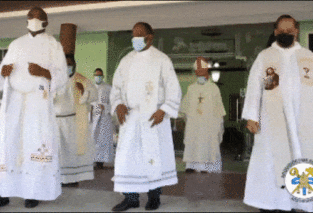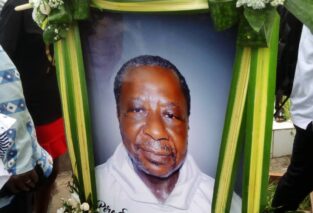A few Sundays ago, Anglophone Christians of the Our Lady of Annunciation Parish in Bonamoussadi, Douala, met to reflect on ways and means of raising funds to renovate their church. I was asked to say a word on “Giving to the Church as a Christian Duty,” and, in a nutshell, this is what I shared with my fellow Christians.
Sacred Scripture tells us that God created the world and everything in it, including man and woman, created in His own image and likeness (Gen 1:27). This means that God owns everything in the world, you and me included. He could have kept his creation and creatures to Himself. Nothing obliged Him to part with them. However, in His boundless generosity, He entrusted them all to man and woman. He told them to go and “Be fruitful and multiply, and fill the earth and subdue it; and have dominion over the fish of the sea, and over the birds of the air, and the cattle, and over all the wild animals and all the creatures that crawl on the ground” (Gen 1:28).
By entrusting His entire creation to man and woman, God makes you and me the custodians or stewards of his creation. In the Old Testament, God’s people, recognizing their role as mere custodians or stewards of God’s creation, decided to show their gratitude to God by returning to Him, through temple offerings, 10% of their income, and keeping 90% of it for themselves. This is where the concept of the tithe arose. In our day, we talk of giving a percentage of our yearly income to God in Church contribution. Even if the Church these days does not insist on a particular percentage of our income we should give to the Church, we are still required to contribute to the upkeep of God’s house.
The history of God’s people tells us that back in the year 538 BC, the king of Persia, Cyrus, authorized the Israelites, who were just then returning from exile, to rebuild the Temple of Jerusalem. In the Book of Ezra, the king tells his people that “All the kingdoms of the earth the Lord, the God of heaven, has given to me, and he has also charged me to build him a house in Jerusalem, which is in Judah” (Ez 1:4)
This does not go down well with the neighbouring peoples, who are determined to disrupt the king’s project. It is then that a courageous prophet, Haggai, appears on the scene to encourage the people not to give up. “Is it time for you to dwell in your own paneled houses, while this house lies in ruins?” he asks the Jews, pointing to God’s house. Then he urges them to go up into the hill country, bring timber, and build the house that the Lord may take pleasure in it (Hag 1: 4. 8).
You would think the prophet Haggai was speaking to the Christians of Bonamoussadi today as we too face this great challenge to give God’s house a new and better look. If you listen well, you will hear the prophet urging each and everyone of us to go up to the hill country and bring back timber for the renovation of God’s house.
Some may be wondering what this timber is, or should be. It can be timber in kind or in cash. If you pledge money, that will be your own timber. It can also be real timber, log and wood, for the rafters, the windows or the doors. It can be timber in terms of the time you are able to give by participating in deliberations around this Church project. It can be timber in the professional advice you can give us. Some of us are lawyers, accountants, security experts, etc. Your input is invaluable to us.
When the first Christian missionaries came to our land, they did everything for us and we were mere spectators, watching from the sideline. We were, for the most part, not well educated to assume responsibility for building our own churches, schools and hospitals. The mentality was created that all such structures were the responsibility of the priest alone, who was, for the most part, a white priest.
Many of us still unfortunately continue to think this way. It was understandable in those days when European missionaries could bring money from their own country and build churches, schools, colleges, and hospitals for us. But today, who do we have as our parish priest? Father Ignatius Musi, S.J., from Njindom in the Northwest Region! He is one of us. We saw him grow up among us as a seminarian; today, he is our priest. Do we expect him to go to his parents to get money with which to renovate our church? This is where we hear the prophet Haggai challenging us to go up to the hill country ourselves and bring our own timber to build God’s house here in Bonamoussadi.
The Servant of God, Pope Paul VI, the first reigning Pontiff ever to visit Africa, challenged the Church that is in Africa from Kampala, Uganda, on 31 July 1969, when he said, “By now, you Africans are missionaries to yourselves.” He was simply asking us to take over responsibility for the building and running of our own churches. The days when Europe coughed up money for such projects are long gone.
A similar view was recently reiterated by another Servant of God, John Paul II in his Post Synodal Apostolic Exhortation, Ecclesia in Africa. In it, the Holy Father also challenges us, Africans, to take possession of our own churches through what he calls “inter-parish cooperation”, where wealthier parishes of each diocese help the less fortunate ones. “It is therefore urgent,” writes the Holy Father, “that the particular Churches in Africa have the objective of providing for their own needs as soon as possible, thereby assuring their self-sufficiency” (Ecclesia in Africa, No 104).
Whenever our Archbishop Emeritus, Christian Cardinal Tumi, visits a parish he deems better off than others, he always urges solidarity with the poorer parishes. It’s not rare for him to come down from the altar himself and stand in front with a basket in hand to collect funds for the poorer parishes.
We should also be guided by Saint Paul’s example. Writing to his converts of Corinth, he expresses words of praise for the churches of Macedonia that have come to the rescue of the poorer churches of Jerusalem. “For they gave according to their means … of their own free will, begging earnestly for the favor of taking part in the relief” of the poorer churches (2 Cor 8:3-4). He then declares, “Whoever sows sparingly will also reap sparingly, and whoever sows bountifully will also reap bountifully,” before adding his now famous and often quoted saying: “God loves a cheerful giver” (2 Cor 9: 6-7).
So brothers and sisters, helping to build God’s house is a Christian duty. God is not asking you to give all that you have to Him. No, He is merely asking that you return to Him a small percentage of what He has given you through the Church of his Son, Our Lord and Saviour Jesus Christ, that is in Bonamoussadi. As you drop your coin into that till, our Blessed Lord will be watching and telling his disciples that your contribution is worth much more than the excesses from the wallets of the rich because from your poverty you have offered all that you have to God (Lk 21:3-4).




